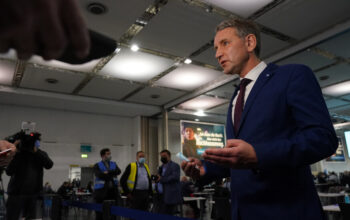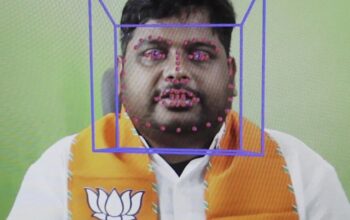
With 12-foot-high wire fencing going up around the Parliament building, and a mobilization of provincial police about six miles away, the protesting truck drivers who have occupied downtown Ottawa for weeks were on alert for possibly imminent police action.
Like truckers who had mounted blockades in other parts of Canada, they expressed defiance and the intent to hold firm against any effort to disperse them. But the defiance melted away at the other protest sites as law enforcement moved in, and the big question on Thursday was whether the same would happen in Ottawa.
Samantha Dougherty, 32, a protest supporter, patrolled the area around a truck facing Parliament. Inside the truck was her new friend, Lenny Frey, she said, who had been parked there for 20 days and had no intention of leaving.
“Nobody is allowed within 6 feet of this truck,” said Ms. Dougherty, a blow horn in one hand and a cigarette in the other. “This truck is not moving, over my dead body.”
Ms. Dougherty said she had met Mr. Frey at the protest and that they had bonded over their love of freedom. She admonished anyone who got near and told Mr. Frey to keep his window rolled up.
“This is life or death for him,” she said.
She gestured toward an S.U.V. carrying police officers passing by, saying, “Pretty wild, eh?”
“Bring the best you got, we’re fighting for our country and they’re fighting for their job,” she added. “They’re Trudeau’s henchman.”
Any police response would be an overreaction, said another protester, Mark Fenson, 55, who said he was a drug and alcohol counselor from Petersburg, Ontario, and had spent the last 22 months attending anti-vaccine and anti-lockdown protests. Pointing toward the encampment, which at times has included recreation activities for children, he said a clampdown would be “going a little far for a bunch of bouncy castles.”
Still, Mr. Fenson said he would allow himself to be arrested, although he felt Prime Minister Justin Trudeau and the police were unfairly targeting the protesters. He said he believed that the official forces were acting on behalf of global elites trying to implement a new world order. “I’m not about to fight against them,” he said. “I’ll deal with them in court.”
Throughout the occupation, the truckers and their supporters have cast the protests as a lawful part of the democratic process. Any effort to remove them, they say, is a violation of their rights as outlined in the Charter of Rights and Freedoms, the Canadian bill of rights.
That perspective has been rejected by officials, much of the public and legal scholars, who note that the charter includes specific limits on those rights to protect other rights and national values. Government officials have said repeatedly that the Ottawa protesters blocking daily life are breaking the law.
However, for these protesters, it is the police and Mr. Trudeau’s enactment of emergency measures that are unlawful and unpatriotic, not them or their actions. That echoes sentiments also found among those who participated in the Jan. 6 riot at the U.S. Capitol, and among some influential right-wing commentators, like the Fox News host Tucker Carlson.
“It’s a chess game between the freedom of the people, and a new world order,” said Mr. Fenson.



